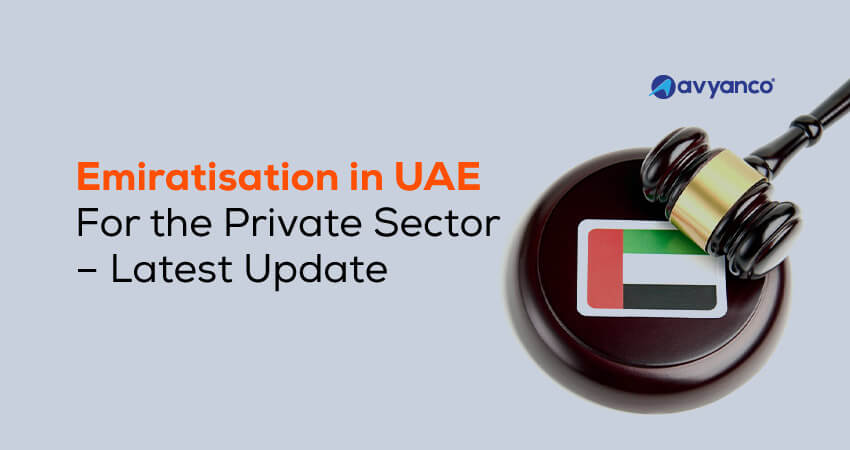Around 62% of Emiratis claim finding a job in the private sector is challenging. In fact, only 7.6% of people working in the UAE are Emiratis. The UAE government introduced Emiratisation to respond to this challenge. It is part of a comprehensive modernization and business growth program. The new Emiratisation program strives to increase the count of Emiratis in the private sector to 75,000 by 2026.
So, what is Emiratisation? And how is it changing the corporate sector? Read the article to learn more about it!
Emiratisation Rule UAE
Emiratisation in the UAE is an initiative started by the UAE Government that mandates the inclusion of Emiratis in the job sector. It aims to increase the number of Emiratis in the UAE job market and their economic impact.
While the public sector has actively embraced the initiative, the private sector still integrates Emiratis into its workforce. A recent cabinet decision now mandates hiring UAE nationals in the private sector to address it.
The Ministry of Human Resources and Emiratisation categorizes companies into three tiers to encourage compliance with UAE Emitarisation Law.
Category 1: Companies Meeting Emiratisation Objectives
Companies falling under Category 1 must achieve at least one of the following objectives:
- Employ and train at least 500 Emiratis yearly.
- Increase their Emiratisation quotas at least three times above the target annually.
- Be a small or medium company owned by a young UAE national.
- Be active in sectors chosen by the Council of Ministers.
- Be a qualifying training and employment center.
The MoHRE will charge a maximum of AED 250 for work permits over two years as a reward. UAE and GCC (Gulf Cooperation Council) employees will not be charged any such fee.
Category 2: Companies Meeting 2% Emiratisation Quota
Companies in this category, failing to meet the criteria in Category 1, still comply with the Emiratisation quota of 2% per year. The classification is based on how well they follow labor laws, wage protection systems, and other regulations. Smaller categories (A, B, C, or D) depend on the ratio of skilled workers and their commitment to diversity.
MoHRE charges a work permit fee set at AED 1,200 for two years for these companies. However, UAE or GCC employees will not incur the fees.
Category 3: Establishments Falling Below Emiratisation Quota
Companies not meeting the Emiratisation quota or breaking other rules mentioned in Ministerial Resolution No. 209 fall under this category. For instance,
- Hiring workers without work permits.
- Providing false data, documents, or information to the Ministry.
- Violating obligations on workers’ wages, safety, and housing standards.
- Conducting fraudulent Emiratisation practices.
Emiratisation is about helping local people grow in their careers, learn essential skills, get helpful experience, and understand how companies work. The UAE government wants young Emiratis to challenge themselves and become skilled professionals who can do well worldwide.
Impact of Emiratisation Rule on UAE Businesses
Emiratisation in the UAE reduces reliance on expatriate labor and emphasizes long-term economic self-reliance. An engaged local workforce significantly influences economic diversification and innovation. It also ensures a sustainable future for businesses in the UAE.
The Emiratisation program targets private sector businesses and individual associations with a workforce ranging from 20 to 49 employees. It extends to a broader range of economic activities compared to the previously applicable rules for companies with 50 or more employees.
Private establishments in the sectors listed below, meeting the specified employee threshold, must adhere to the new rules:
- Information and communications
- Construction
- Financial and insurance activities
- Real estate
- Transformative industries
- Professional and technical activities
- Wholesale and retail
- Administrative and support services
- Arts and Entertainment
- Warehousing and Transportation
- Mining and quarrying
- Education
- Hospitality and residency services
- Healthcare and social work
UAE Emiratisation law drives UAE businesses to create inclusive work environments aligned with local values. Integrating citizens into the workforce brings unique perspectives and strengthens relationships. The expected increase in women holding higher positions also contributes to a more diverse and inclusive workplace.
Emiratisation is making a big difference in the UAE job market. The strategic initiative actively involves Emiratis and drives a more equitable workforce across diverse sectors.
The Requirements Outlined in the UAE 2% Emiratisation
The 2% Emiratisation law is for the private sector, specifically for companies registered across mainland UAE. The UAE has strengthened its local workforce by changing its Emiratisation rules, where private companies with 20 to 49 employees are now part of the initiative. The goal is to reach 6% Emirati employment in 2024, in 2025 8%, and in 2026 10%.
All employers with over 50 employees must increase their Emiratisation rate by 2% of skilled workers each year. Private sector companies must adhere to the new Emiratisation Law and apply the following scheme:
- For 50 skilled workers: The minimum target is to hire one UAE national employee.
- For 51–100 skilled workers: The minimum target is to hire two UAE national employees.
- For 101–150 skilled workers: The minimum target is to hire three UAE national employees.
- For more than 151 workers: One UAE national employee should be hired for every 50 workers.
MoHRE, the Ministry of Human Resources and Emiratisation, defines skilled workers as employees meeting any of the following qualifications:
- Having a certificate higher than secondary or equivalent;
- Possessing a worker certificate attested by a competent authority;
- Earning a salary of no less than AED 4,000 per month;
- Falling under categories such as:
- Legislators, business executives, managers
- Writing professionals
- Technical, scientific, and human field professionals, technicians
- Service and sales occupations.
Orders of the Council of Ministers in UAE impose a quota system on employers, requiring recruitment of a sufficient number of Emirates to ensure they make up a specified percentage, as a minimum, of staff numbers. The current thresholds for Emiratisation in the private sector are:
- Commercial entities with over 50 employees should have a 2% Emiratisation rate.
- Banks should have a 4% Emiratisation rate.
- Insurance companies with over 50 employees should maintain a 5% Emiratisation rate.
Businesses must increase by 1% every six months to meet these targets. Companies in free zones, including ADGM and DIFC, are not obligated to follow these laws. However, they are free to contribute if they find suitable Emirati talent.
The Penalties Under the New Emiratisation Rule UAE
Non-compliance to Emiratisation regulations has substantial repercussions for UAE employers.
Here are several ways companies face the consequences of neglecting the set rules:
- Fines and Penalties
Establishments that do not stick to the new rules will face fines:
- AED 96,000 if they have not recruited at least one Emirati in 2024.
- AED 108,000 if they have not employed at least two Emiratis in 2025.
Not paying the fines could result in suspension and affect the ability to apply for or renew work permits. Employers in the commercial and public sectors should carefully consider the consequences, including potential financial penalties when terminating a UAE national.
- Legal Action
The UAE government takes legal action against companies following fraudulent Emiratisation practices. It can lead to high-priced legal battles and impact the finances and reputation of a firm.
The Ministry of Human Resources and Emiratisation recovered Dh2.3 million from citizens who accepted deceptive job offers. Despite financial incentives, the Ministry warns citizens to be cautious of unethical offers and signifies the importance of genuine compliance.
- Reputational Damage
Neglecting Emiratisation or faking compliance can seriously impede a company’s growth prospects. The news of non-compliance can erode trust from customers, partners, and stakeholders. It can result in missed business opportunities and a decline in market shares.
- Limited Growth Opportunities
When companies are found non-compliant, especially with fake Emiratisation, it can significantly harm their reputation. Media coverage often highlights cases of noncompliance, like a prominent construction company in the UAE facing a substantial fine for hiring ghost workers to fulfill Emiratisation requirements, resulting in severe reputational damage.
Wrapping Up
Companies must assess their current employee numbers to decide if they follow the rules. If required to comply, one should determine whether to follow the new rules for companies with 20 to 49 employees, as mentioned above, or the earlier laws for companies with 50 or more employees.
It is crucial to keep track of the number of UAE nationals you employ in your business and have a system to monitor resignations. It ensures continuous compliance with the rules.
Whether you are getting a new business license or want to stay on top of the latest Emiratisation Law in the UAE, Avyanco is here to guide you. We have been a reliable partner for UAE businesses and assist entrepreneurs and business owners in navigating processes to help you make your business successful.
FAQs
- What is Emiratisation in the UAE?
Emiratisation is a core policy in the United Arab Emirates. It encourages Emirati citizens to participate in social and economic development. The initiative aims to increase job opportunities and career growth for Emiratis in their home country.
2. What is the Emiratisation Quota in UAE?
Emiratisation is a core policy in the United Arab Emirates. It encourages Emirati citizens to participate in social and economic development. The initiative aims to increase job opportunities and career growth for Emiratis in their home country.
3. What is the Emiratisation Quota in UAE?
The emiratisation quota in the UAE is rising gradually. The current thresholds are:
- 2% for commercial entities having over 50 employees,
- 4% for banks, and
- 5% for insurance companies with more than 50 workers.
4. What is the Target of Emiratisation in 2024?
Firms must increase the proportion of Emirati employees by 1% every six months. As a result, employers must reach a 4% target by the end of the year and increase it to 6% by 2024.









